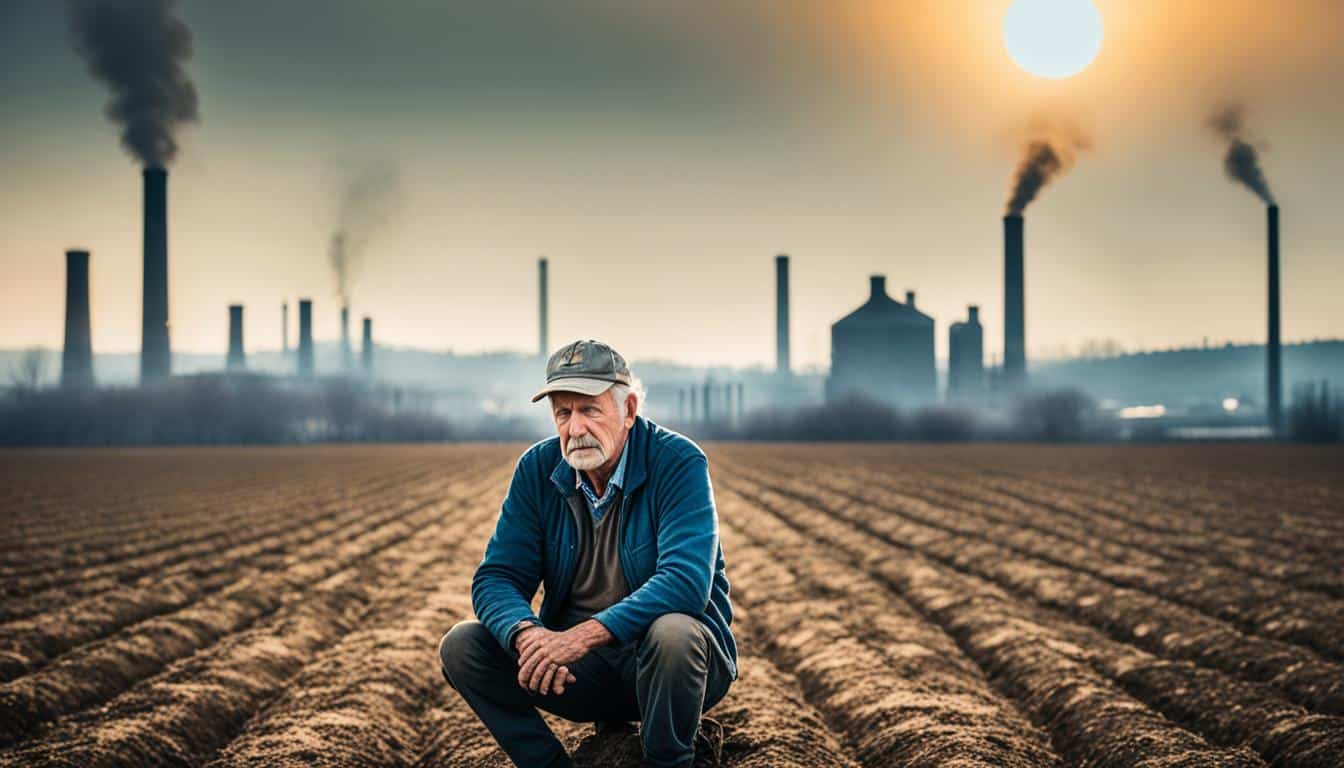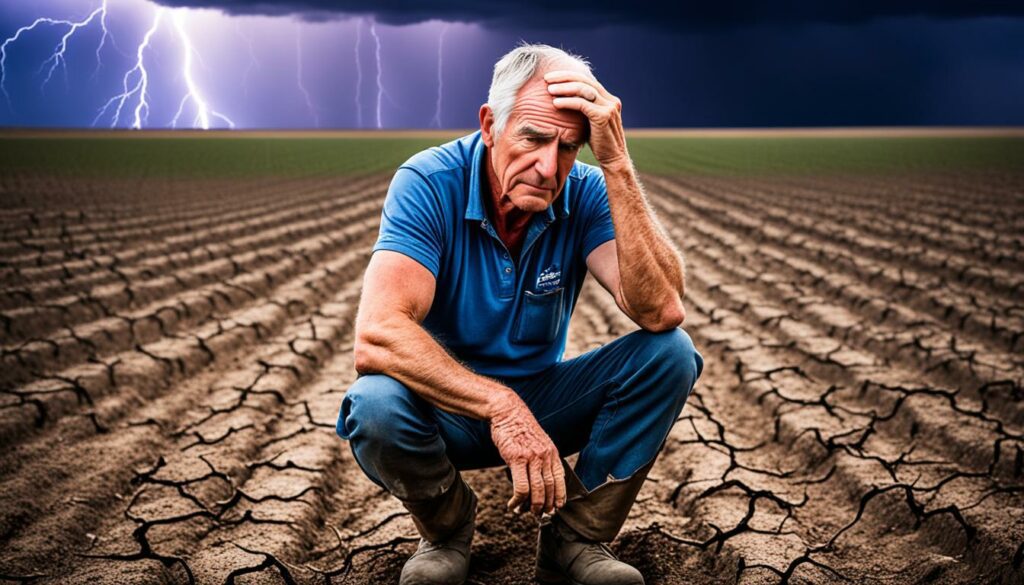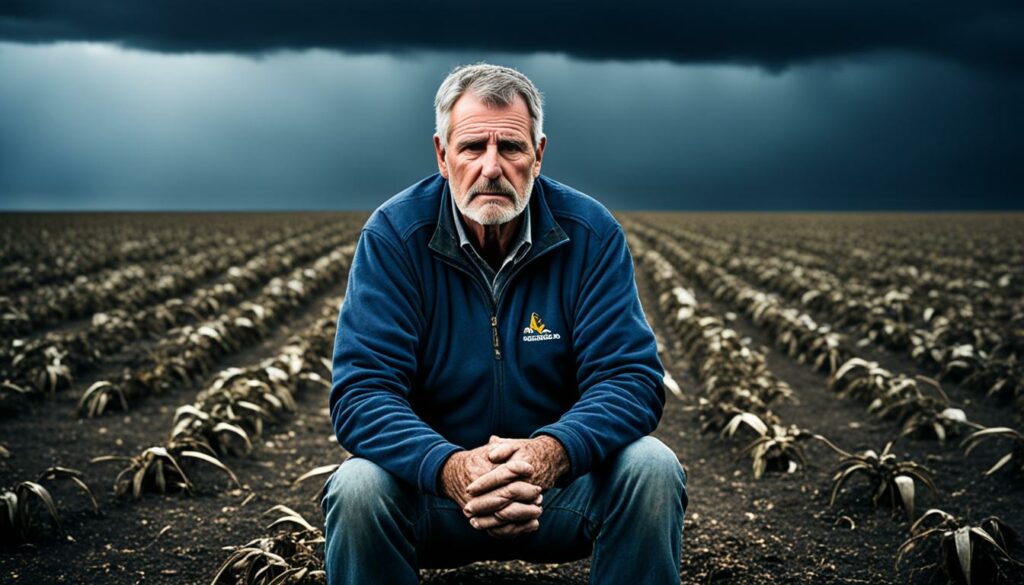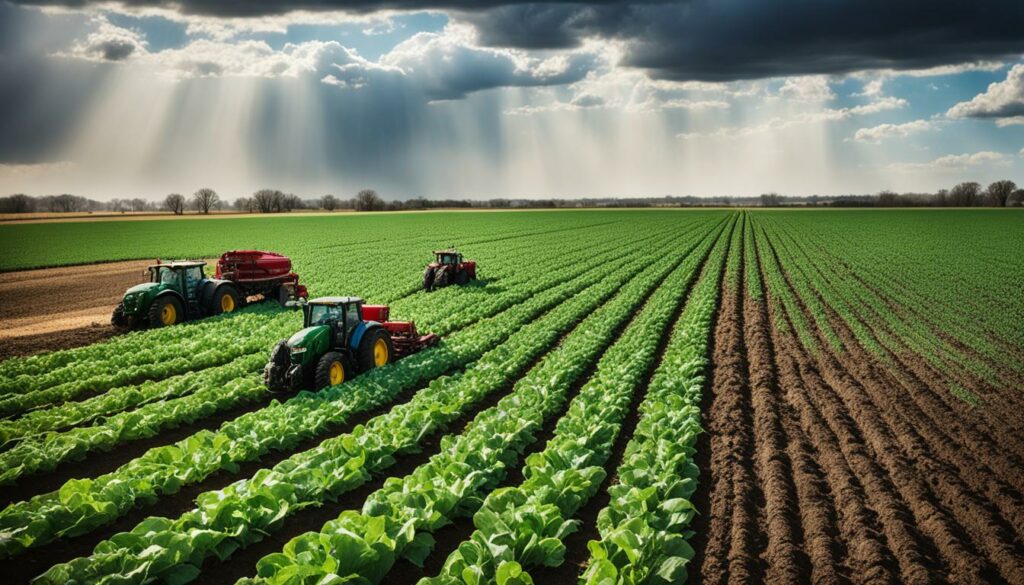Menu

In 2020, the suicide rate for US farmers, ranchers, and agricultural managers hit a record high. It was 43.7 per 100,000 people, three times the national average. This shocking figure highlights the growing mental health crisis amongst farmers dealing with climate change.
The effects of climate change are causing more stress and worry for those working the land. They face a range of health issues like heatstroke, dehydration, and respiratory problems due to extreme weather. Alongside these health risks, financial pressures from crop damage and lost equipment can lead to serious mental health issues.
Farmers are known for being tough and handling things on their own. They often don’t reach out for mental health support. Sadly, many people in rural areas also struggle to access mental health services. This double challenge means fewer farmers get the help they need. These issues show how critical it is to support the mental health of our farmers facing the brunt of the climate crisis.
As our climate problems worsen, it’s crucial to look deeper into its effect on the mental health of those who grow our food.
As a farmer, I’m fully aware of the severe impacts of climate change on our agricultural industry. Every year, unpredictable weather and economic strains make our work harder. To clearly see how these challenges affect us, it’s important to break down the factors influencing our livelihood.
Extreme weather events are happening more often, challenging farmers globally. For instance, severe droughts in New South Wales and Victoria led to an increase in farmer suicides. These events show how weather extremes can impact both the environment and people’s mental health.
The loss of crops and damage to equipment from such weather further stress us. This pressure includes both financial and emotional burdens.
Climate changes greatly affect our crop yields, making it a top worry for us. When the weather is unpredictable, growing conditions change, often leading to poor crop outcomes. In Karnataka, these stresses reflected in high rates of farmer suicides.
Such uncertainties lower our productivity and add to our mental health challenges. We’re constantly trying to cope with a changing climate.
Looking into the economic side of climate change, its effects on us farmers are huge. When our crops fail or our equipment gets damaged, we face big financial losses. For instance, floods around Dongting Lake in China led to a lowering of life quality.
Such events not only hurt us financially but also lead to mental health issues. It’s clear that we need strong strategies to deal with these effects.
| Region | Climate Event | Mental Health Impact | Economic Impact |
|---|---|---|---|
| New South Wales | Drought (1970–2007) | Increased Suicide Rates | Crop Loss |
| Victoria | Drought (2001-2007) | Increased Farming Suicides | Equipment Damage |
| Karnataka | Agrarian Distress | Mental Health Struggles | Crop Quality Decrease |
| Dongting Lake, China | Flood | Decline in Quality of Life | Economic Setbacks |
It’s key to truly understand these challenges if we want to make progress. The damage to our environment and the financial pressures are urgent. We need strong, complete strategies to help our mental and economic well-being.
Climate change has wide-reaching effects, impacting the mental health of farmers. It brings more stress and anxiety. This can lead to depression in farming. There’s also eco-anxiety and ecological grief.

Studies show a clear connection between tough weather and mental health. For example, Kjellstrom and Holmer in 2009 talked about the dangers of working in the heat. They focused on poor countries dealing with climate change. This can cause stress and anxiety among farmers, especially with unexpected weather and long droughts.
A study by Hanigan et al. in 2012 looked at suicides during a drought in New South Wales, Australia, from 1970 to 2007. They found the stress from drought increased suicide rates. This highlighted the need for more mental health awareness.
Research has shown a big jump in depression in farming areas when the weather gets extreme. For example, Guiney found more farming suicides during the Victorian drought in Australia from 2001 to 2007. The same is seen in Deshpande’s work on farmer suicides in Karnataka, India.
Sarma’s 2004 study in Andhra Pradesh, India, showed that when the local economy fails, farmers feel hopeless. These times can make depression worse.
New terms like eco-anxiety and ecological grief explain some of the mental struggles due to climate change. People feel these when they see nature getting worse and fear for the future. For instance, Parry and others in 2007 looked at how climate change can make some people deeply sad.
| Study | Location | Focus | Findings |
|---|---|---|---|
| Hanigan et al. (2012) | New South Wales, Australia | Link between suicide and drought | Increased suicide rates during drought years |
| Guiney (2012) | Victoria, Australia | Farming suicides during drought | Rise in suicides from 2001-2007 |
| Deshpande (2002) | Karnataka, India | Agrarian distress | Farmer suicides due to economic hardship |
| Sarma (2004) | Andhra Pradesh, India | Breakdown of rural economy | Increased rates of farmer suicides |
| Kjellstrom and Holmer (2009) | Global | Workplace heat stress | Health impacts in low and middle-income countries |
To help, we need to address what’s causing these mental health issues. It’s essential for the well-being of our farming communities as climate change continues to challenge them.
Climate change affects farmers in many ways. It hits them hard, both economically and in terms of their mental health. This is more intense in rural areas. There, the local economy may be on a downswing. Also, getting help for mental health can be tough, and there’s a lot of shame around it.
In rural places, economies can be really tough. When the weather changes for the worse, crops suffer. This leads to less money for farmers. It’s no surprise this can make their mental health worse. The World Health Organization has warned about these problems and said we need to help.
Getting mental health help in the countryside is often hard. There just aren’t enough services out there. So, many farmers feel alone and stressed. Having strong local support is key to fixing this issue.
In some places, it’s not common to talk about mental health. This makes it hard for farmers to ask for help. Without open conversations, problems can get bigger. Over time, this makes the situation worse for everyone.
We must work on these issues to help farmers. This means making sure the economic situation isn’t as bad. It also means making mental health services easier to get to. And we need to get rid of the shame around mental health. By doing this, we can make farming communities better places for everyone’s mental health.
In my search for the link between climate change and farmer well-being, I’ve heard many moving stories. Across the U.S., farmers face challenges like extreme heat, droughts, and heavy storms. Their stories show not only their struggles but also their incredible resilience.

One story is from the Midwest, hit hard by crop losses. In the last two years, weather-related issues led to over $16 billion in aid for farmers. This crisis has made mental health problems worse, pushing some farmers to their limits as they fight for their farms to survive.
Also, the number of farms dropped by 6.9% from 2017 to 2022. This decline shows the heavy impacts on these rural areas, both economically and emotionally.
In Texas, the effects of climate change are clear. Insurance payouts have hit record highs in the past two years due to severe weather. Still, more young people are joining the farming sector. This shows growing resilience and the will to face these issues head-on.
Organisations like StoryCorps have collected 650,000 interviews, including from the Swinomish Indian Tribal Community. They tell of a heat wave reaching 116 degrees, affecting their traditional foods like salmon. These personal accounts show how climate change affects health and culture in unequal ways.
People like Fred and Graham Christenson are leading the way in climate adaption. They’re using sustainable methods to fight environmental changes. Their approach is a model of resilience, using innovation to protect their farms and way of life.
| Region | Challenges | Adaptation Measures |
|---|---|---|
| Midwest | Crop losses from extreme weather | Increased government assistance, adoption of climate-smart agriculture |
| Texas | High insurance payouts due to climate variability | Rising young producers adopting resilient practices |
| Pacific Northwest | Record-setting heat waves affecting traditional foods | Community-led initiatives, focus on indigenous foods |
These stories shed light on the difficult path farmers tread in a changing climate. They aim for a balance between keeping mentally well and adapting to new weather patterns. Their journey embodies a message of hope and resilience for us all.
Farmers face many health issues because of the weather, especially extreme conditions. It greatly affects their health. They can suffer from heatstroke, dehydration, breathing problems, and get hurt, putting them at serious risk.
Being in high temperatures for long periods can cause heatstroke and dehydration. This is a big risk for farmers in hot fields. They might experience confusion, a fast heartbeat, or even faint. Studies have shown that extreme weather makes these health issues worse.
Natural disasters and changing weather patterns release harmful pollutants. These include wildfires, dust storms, and more pollen. This pollution can lead to ongoing health conditions like asthma or bronchitis for farmers. It makes their work even more challenging. Also, the air getting worse from climate change makes these breathing problems more common.
Bad weather can also increase the chances of getting hurt or having an accident. Using big and heavy machines in bad weather is dangerous. It might make them operate incorrectly. Floods and droughts change the land too, creating more accident risks.
From heatstroke to chronic breathing problems, and from cuts to fractures, it’s clear that extreme weather is tough on farmers. It’s vital to look after their health. This includes their physical health and how they feel emotionally.
| Health Issue | Contributing Factor | Effect |
|---|---|---|
| Heatstroke | High Temperatures | Confusion, Rapid Heartbeat |
| Dehydration | Prolonged Sun Exposure | Fatigue, Dizziness |
| Respiratory Issues | Pollutants, Dust, Pollen | Asthma, Bronchitis |
| Physical Injuries | Adverse Weather Conditions | Fractures, Cuts |
Community support is crucial for improving mental health among farmers, especially in rural areas. Having strong networks can lower stress and help people feel less alone. This makes life better for those working in farming.
Creating closer community bonds is a great way to boost mental health. In the countryside, mental health difficulties are more common, but support networks are life savers. They provide help, support, and a feeling of being part of something, especially important in tough times.
Community events and local projects can make a big difference. They cut costs and help the environment, all while bringing people together. This can ease the effects of stress, like sleep problems and anxiety, helping farmers cope better.

Peer support is essential for mental health. It lets people learn from each other and feel less alone. For farmers dealing with bad weather and its effects on health, like heart disease, it’s key.
Programmes like those from SIU Medicine are very important. They offer support tailored for farmers and help reduce the shame around mental health. This encourages more to get help if they need it.
Working together in these support networks helps everyone. They improve personal mental health and make rural areas as a whole tougher. As we tackle climate change’s effects on farmers, these support systems are vital for a healthy farming community.
It’s vital for farmers and the environment to use sustainable farming techniques. Studies show that climate-smart farming can reduce the stress from climate change. It helps farmers stay strong and less affected by mental health issues.
Climate-smart agriculture uses methods and tech to make farms better. By doing things like regenerative farming and rotating crops, the land stays healthier. This also helps lower the worry and sadness about the changing environment.
Sustainable farming is good for the planet and people, says Polain et al. (2011) and Hogan et al. (2011). It helps the farm last longer and lowers the stress of climate changes. As the earth gets hotter, like in Montana, we need to do more sustainable farming to keep nature and farmers well.
Agriculture in Montana makes a lot of money, $4.6 billion each year. It’s key for farming to be sustainable for the land and the people. With expected lower crops and livestock by 2050, using sustainable ways is essential. It can save jobs and keep $3.3 billion in wages. Working on farming in a better way is crucial for the future and for mental health.
With climate change on the rise, many are feeling climate-related anxiety. It’s crucial to find ways to cope. This is key to keeping our minds healthy while facing environmental worries.

Fighting the emotional battle of climate change requires good coping mechanisms. Being part of green activities can help. It makes us feel like we’re doing something and not alone. For example, joining a local environmental group, like the ones at Cornell University, can give us strength and focus. Reading good news on climate solutions is also important. It shows us the positive steps being taken.
Being mindful is great for lowering climate anxiety. Practices like meditation, slow breathing, and yoga bring us back to now. This takes our minds off the huge climate problem.
It’s also helpful to reduce everyday stress. This can mean improving our insurance, choosing local food, and saving energy. These steps make us feel like we’re fighting back. Taking action helps us worry less.
In places where mental health issues are higher, like Alaska and Idaho, these techniques are even more important. They can also help those hit by natural disasters. For example, after Hurricane Katrina, being mindful helped some people cope. It made them stronger and mentally healthier.
It’s very important for the government to help with the mental health of farmers and to promote sustainable farming. Policy changes can lead to long-lasting solutions. They can make life better for farmers and build their ability to cope.
Farmers’ mental health issues have been overlooked for a long time. But now, there’s a focus on this crucial area. The 2018 Farm Bill was a big step forward. It started funding mental health services. This help included grants for the Farm and Ranch Stress Assistance Network (FRSAN). Thanks to this, four centres were set up to provide training, support groups, and better emergency helplines. However, we still need to do more to help.
Besides mental health, we also need to support farmers in keeping their practices sustainable. Policies should encourage farming methods that are good for the earth. Such methods also help fight the mental strain worsened by climate conditions. Young farmers have said that they often face challenges from climate change. But, with the right policies, the stress can be lessened.
For instance, the 2023 Farm Bill plans to give $15 million each year to FRSAN. This funding aims to support more experts in mental health and offer various communities holistic help. Another way to help is by giving farmers reasons to choose eco-friendly methods. This help can come in the form of money, tax breaks, or other government support. It aims to reduce farming’s impact on the environment and make farmers feel better.
Australian farmers face serious challenges due to climate change. This impacts their mental health significantly. The case study looks at how climate change and farm resilience affect farmer well-being. It uses data and real stories to show the issues they deal with.
Research shows farming is linked to mental health problems. Studies tell us about the impact on farm marriages and the stress farmers face. They also compare this to Canadian farmers’ experiences.

Experts point out that farmers’ mental health can suffer from issues like economic difficulties. They say young farmers face anxiety and stress. This matches studies on depression in different farming groups.
There is a worrying increase in suicides among farmers, studies show. High-risk jobs and climate change make mental health support crucial for farmers. Governments and services must focus on helping these communities.
In Western Australia, farmers face personal challenges due to climate change. Interviews suggest this has affected their sense of self and mental well-being. The stress and mental health risks are significant.
| Issue | Impact |
|---|---|
| Weather Worries | Increased anxiety due to unpredictable climate patterns |
| Drought | Linked to higher suicide rates (1.8% up to 3.3%) |
| Economic Challenges | Can affect mental health and marriages |
| Place-based Distress | Results in identity and attachment issues from climate change impacts |
This case study highlights how climate change affects Australian farmers. They face issues like depression and suicide risks. Helping them with their mental health is crucial. Governments, organisations, and mental health services must work together to support these communities.
Climate change is impacting our world more than ever. We need to find new ways to live sustainably and help our farms fight back. Farmers and ranchers are hit hard by the changing climate and its effects on their income. They can use smart strategies and tech to meet these challenges.
The farming community is facing a mental health crisis. In 2020, the suicide rate was 43.7 for every 100,000 farmers, far above the national average. We need creative solutions that look after both the environment and farmers’ mental health.
One bright idea is to use new tech in farming. Things like GPS and IoT sensors help farmers take better care of their crops. This not only saves resources but also cuts down on waste. It’s a big win for the planet.
But, tech isn’t the only answer. Local groups can also make a big difference. Farmer co-ops and community support are there to provide help and support, particularly during tough times. They show farmers they’re not alone in facing the challenges of a changing climate.
| Solution | Benefits | Challenges |
|---|---|---|
| Precision Agriculture | Increased efficiency, reduced resource use, improved crop yields | High initial cost, need for technical expertise |
| Agroforestry | Enhanced biodiversity, soil health improvement, carbon sequestration | Long-term commitment, initial slow returns |
| Community-led Initiatives | Peer support, resource sharing, collective problem-solving | Coordination challenges, dependence on voluntary participation |
To fight climate change and help our farmers, we must use all these solutions together. Mental wellbeing in the farming sector is as critical as the environment. So, we must support farmers with practical climate approaches and strong community support. This is the key to a sustainable future.
Farmers need to be aware of their mental health as the effects of climate change grow. They deal with stress, low profits, and the dangers of their jobs. Often, they are far from mental health services. To help them, we must provide education and resources to strengthen their community.

Knowing about mental health is key to helping farmers face climate change. Many studies have shown that farmers feel stress, anxiety, and other mental pressures from their work. With climate change impacting their jobs, it’s important to support them. But, there’s not enough research on how it affects American farmers’ mental health and emotions.
Teaching about climate change and giving resources helps support farmers. The Farm and Ranch Stress Assistance Network now helps farmers with their mental health, thanks to the 2018 Farm Bill. The 2023 Farm Bill wants to give $15 million every year for five years to help even more. This shows a big step in combining mental health with efforts to tackle climate change, supporting farmers better.
| Concern | Statistics |
|---|---|
| General Climate Change Worry | 64% of Americans |
| Feelings of Sadness | 50% of Americans |
| Feelings of Fear or Anger | 40% of Americans |
| Suicide Rate Among Farmers | 43.7 per 100,000 |
| Suicide Rate Among General Population | 14.1 per 100,000 |
Climate change goes much further than just shaking up our weather. It reflects a big challenge for farming’s future. Rising temperatures and unpredictable weather threaten how we farm. Berry et al. (2011) noted that farmers’ mental health suffers due to these changes, making things even harder. Decisions about farming’s future under climate challenges are crucial, says Hogan, Bode, and Berry (2010). They point out how deep this issue goes for farmers.
Adapting to climate change and reducing risks are key to farming’s future. Smit and Wandel (2006), along with Milne et al. (2008), say improving our ability to handle change is vital for farming to last. This need to change also applies to fishers, according to Pickworth et al. (2007). Moving towards more eco-friendly farming is critical, says Pannell et al. (2006). They push for more conservation-based farming.
Fighting climate change is vital for mental health too. The worry and stress it brings for farmers in places like Montana highlight this. Groups like Farm Aid teach farmers how to deal with climate change’s impacts. This helps keep farming going for the long haul while looking after farmers’ mental health.
The future of farming is at a turning point because of the climate crisis. The connection between climate change and farmer health asks for big plans. With the right steps, agriculture and those who work in it can thrive. We must act fast to create a better, more sustainable future for farming.
Climate change greatly affects the mental health of farmers. It brings about extreme weather, changing climates, and economic pressure. These issues can cause stress, anxiety, and depression, leading to what’s called eco-anxiety and ecological grief.
Extreme weather can destroy crops and change planting and harvest times. This leads to soil getting worse. These issues cause economic harm, which can hurt the mental health of farmers.
Shifting climates mean crops don’t grow the same every year. This makes it hard for farmers to predict their income. It can make financial situations unstable, causing stress and affecting mental health.
The constant worry about climate issues and the struggles to cope financially and emotionally are tough on farmers. They also face the sadness of seeing their environment change. This pile-up of stress can lead to depression and feelings of great loss.
In rural areas, economic problems and limited mental healthcare are significant. The stigma around mental health makes it harder for farmers to get help. This situation can make their mental health issues worse.
Many farmers have talked about their challenges and how they manage them. They’ve shared stories of changing their farming ways, leaning on community help, and looking for better mental health services.
Farmers can suffer from heatstroke, dehydration, and respiratory problems because of extreme weather. They’re more likely to get hurt when working in these conditions. These issues can affect both their physical and mental health.
Strong community bonds and support from peers can ease the stress of farming. These connections offer emotional support. This can help lower mental health issues farmers face in a changing climate.
Using sustainable farming methods like regenerative agriculture and using the sun for energy can help. These methods improve the environment and provide farmers with a purpose. This can make a positive difference in their mental state.
Farmers can deal with climate anxiety by updating their insurance and being more energy-efficient. They can also focus on selling local foods and practice mindfulness to reduce stress.
Government help is key in funding mental health services and promoting sustainable farming. They can create policies that support farmers in dealing with climate challenges. This backing is vital for a stronger farming industry.
Australian farmers are hit hard by changing weather and their heavy reliance on farming. This situation worsens mental health issues. It highlights the global effects of climate change on farmer wellbeing.
Farmers are using new tech and working with their communities to tackle climate issues. They’re using things like plants that can survive droughts and farming methods that use less water. This helps them face challenges and get mental health support.
Getting people to understand and learn about the link between climate change and farmer mental health is vital. Special programs and tools can help farmers manage their mental health better. This is good for their wellbeing and the future of farming.
Climate change seriously affects farming’s future. We need to use sustainable practices and make big changes to save farming and the mental health of its workers. This is critical for the long term.